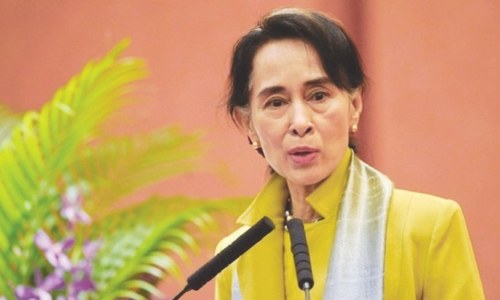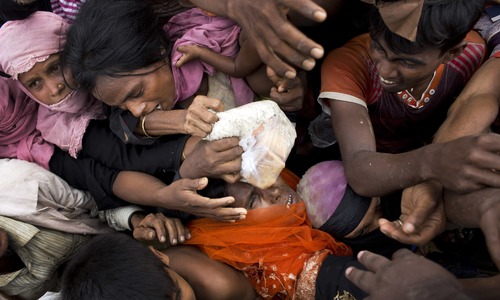In her much-anticipated address, Aung San Suu Kyi said on Tuesday that she does not fear global scrutiny over the Rohingya crisis, pledging to hold rights violators to account and to resettle some of the 410,000 Muslims who have fled army operations in her country.
The de facto leader of Myanmar, however, offered no concrete solutions to stop what the UN calls "ethnic cleansing". Amnesty International said that the Nobel peace prizewinner was "burying her head in the sand" by ignoring army abuses. Her speech was warmly welcomed in Myanmar.
Communal violence has torn through Rakhine state since Rohingya militants staged deadly attacks on police posts on August 25. Hundreds have been killed and hundreds of thousands of Muslim Rohingya driven out of mainly Buddhist Myanmar into Bangladesh.
Suu Kyi has been strongly criticised by the international community for failing to speak up publicly for the stateless Rohingya or to urge restraint on the military.
In a 30-minute televised speech on Tuesday, she reached out to her critics, deploying the soaring rhetoric that once made her a darling of the global rights community.
In an address timed to pre-empt likely censure at the UN General Assembly in New York, she said that Myanmar stood ready "at any time" to repatriate refugees in accordance with a "verification" process agreed with Bangladesh in the early 1990s.
In less than a month, just under half of Rakhine's one-million-strong Rohingya minority has poured into Bangladesh, where they now languish in one of the world's largest refugee camps.
Those "verified as refugees" will be "accepted without any problems and with full assurance of their security and access to humanitarian aid", Suu Kyi said.
It was not immediately clear how many Rohingya would qualify to return.
But the subject of their claims to live in Myanmar is at the heart of a toxic debate about the Muslim group, who are denied citizenship by the state and considered to be illegal immigrants from Bangladesh.
Myanmar's government has previously said it will not take back people linked with "terrorists" and suggested that many of those who fled had set fire to their own villages before leaving.
Suu Kyi's pledge to repatriate the refugees "is new and significant", said Richard Horsey, an independent analyst based in Myanmar, explaining it would in principle allow for the return of those who can prove residence in Myanmar -- rather than citizenship.
"However, there continues to be a live crisis in the north of Rakhine," he said.
A siege mentality has emerged in Myanmar with the UN, international NGOs and foreign media the focus of anger for apparent pro-Rohingya bias.
Many Facebook users changed their profile picture on Tuesday to carry a banner with a photo of 'The Lady' and a message reading, "We stand with you Daw Aung San Suu Kyi" — using an honorific.
No more violence?
In an address delivered entirely in English, Suu Kyi insisted that army "clearance operations" finished on September 5 without any further militant attacks.
But AFP reporters have seen homes on fire in the days following September 5, while testimony from refugees arriving in Bangladesh suggests army operations have continued.
Fresh satellite date published by Human Rights Watch on Tuesday purportedly shows 214 Rohingya villages in ashes.
"If nothing has happened since September 5th, and all the Rohingya have left, who burned them?" Phil Robertson of Human Rights Watch told AFP.
Inside Myanmar, supporters say that the 72-year-old leader lacks the power to rein in the army, with which she is in a delicate power-sharing arrangement.
Deftly avoiding blaming different ethnic groups or the army for violence, Suu Kyi promised to punish anyone found guilty of abuses "regardless of their religion, race or political position".
Rights monitors and Rohingya refugees allege the army — often flanked by ethnic Rakhine mobs — systematically torched their villages, while the UN has accused Myanmar's military of "ethnic cleansing".
The army denies that, insisting its operations are a proportionate response to the raids by Rohingya militants, whom they label "extremist Bengali terrorists".
Amnesty International, which once tirelessly campaigned for Suu Kyi's release from house arrest, pilloried her speech saying 'The Lady' and her government are "burying their heads in the sand" about the horrors unfolding in Rakhine.
Around 170 Rohingya villages have been razed to the ground, the government says, nearly 40 percent of the total in Rakhine.
Suu Kyi said the "majority of Muslims in the Rakhine state have not joined the exodus [...] more than 50 percent of the villages of Muslims are intact".
Rakhine has been in lockdown, with independent access impossible, something Suu Kyi suggested will change since Myanmar does not fear "international scrutiny."
Siege mentality
While stories of weary and hungry Rohingya civilians streaming into Bangladesh have dominated global headlines, there is little sympathy for them among Myanmar's Buddhist majority.
Around 30,000 ethnic Rakhine Buddhists as well as Hindus have also been displaced -- apparent targets of the August 25 attacks by the Arakan Rohingya Salvation Army (ARSA).
Many in Myanmar reject the existence of a Rohingya ethnicity and insist they are "Bengalis" — illegal immigrants from Bangladesh.
Loathing for the Rohingya has brought the public, including prominent pro-democracy activists, into an unlikely alignment with an army that once had them under its heel.
















































